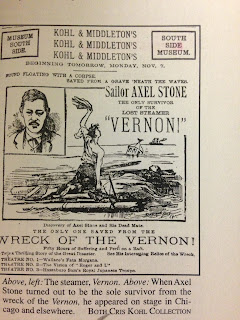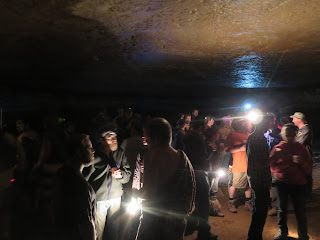I got a good night sleep and was excited to get back on the water for another day of diving. We loaded up the cars and checked out of our motel in a dense fog. Fog is not so great driving through or even navigating in, but it usually means that we will have some calm conditions on the lake....and we did!! The lake layed down for us even more as we set out of Sheboygan Harbor to the shipwreck of the Home. It took us about an hour to get out to the location where the shipwreck was located. It was a cool and calm condition which is pretty ideal for us as we were sweating inside thick undergarments and dry suits. Chris and I buddy up again and proceed to get into the water after Walter, Leo, and Ellery.
 |
| Chris Parks on the Shipwreck of the Home |
I noticed the water at the surface to be super clear and quite cold, colder and clearer than it was at the surface yesterday. We continued our descent down the line and at around 100ft. down, the stern of there Home and the bottom of the lake was noticeable. I always get a kick out of descending down into the depths as I watch a historic shipwreck emerge from the haze and become more identifiable with the deeper we get. Its like a foggy cemetery at dusk with a desert of sand and silt surrounding that stretches into the horizon around the wooden relic.
We continue down the line and notice a couple divers at the bottom with either lights sweeping across the wreck and occasionally communicating with each other. I noticed Walter at the bottom making a couple of circles around the anchor line and when I came into eye contact with him, I gave him an OK signal, He responded with an OK signal but it was not a solid OK. It felt like to me that he was thinking about something and the first thing that came to my mind was that he was not enjoying the wreck as it was smaller than the previous wrecks we were on. He did give me an OK, so I left it at that and continued to run our drills with my dive buddy and circumnavigate the reamins of the Home.
 |
| Shipwreck of the Home |
We went around the wreck and I decided not to penetrate this shipwreck as I was at a depth of 165ft. and wanted to follow a conservative schedule, not blow my tables, and have enough gas for the following dive on the Walter B Allen.
 |
| Shipwreck of the Home |
Plus my camera housing was all fogged up from opening it up in motel moisty so I did not get good photos, again...grrr!!! Sucks that my pictures didn't turn out the way that I wanted them to as this shipwreck is not well documented but, ya cant snap them all. This Wreck reminded me of the Northener a bit but with penetration options.
 |
| Shipwreck of the Home |
Here is a link to some photos that are a bit better than how these photos have turned out.
We started our Ascent and followed our decompression procedures without incident. Once we ascended to a depth of 30ft. I looked up and I did not see my oxygen bottle dangling at 15ft where it should have been and I saw Walters gear tied to the boat. I figured something must have happened and communicated that with my dive buddy. We adjusted our schedules to suit a full procedure and clearing our tables using 50/50 instead of Oxygen at 15Ft. which was not a problem. Always have contingency plans in place. Once we got to the final 10ft ascent to the surface I could see Dave at the stern and I knew it was going to be "Go time" so I prepared for the worst.
Once we surfaced, Dave informed us to move back from the Molly and swim over to the bow so the Coast Guard fast boat could come in tie off to the Molly's portside. The coast guard came all the way from Two Rivers in around 10 minutes or less which was pretty dam quick!! Jitka came around the bow and I asked her what happened, she briefly described the events leading up to that point.
Jitka was telling me that when Walter ascended to the surface he was unconscious, eyes wide open, unresponsive, Cyanotic, and appeared to have been breathing in water. Jitka pulled him up to the boat and Dave dragged him out of the water. She told me that he woke up and after a few minutes and started to recover. Chris and I moved back around to the stern to see if we can get a glimpse of what is going on. We continued to watch the coast guard board the Molly and package Walter in a sled and than they proceeded to board him onto the Coast Guard fast boat. Soon after that, they drive off to Two Rivers and transport him to Appleton hospital for hyperbaric, blood gas, doppler, and decompression illness evaluation. We boarded the Molly and proceed to take off our gear while Dave explained Walters’s condition in the water and on the Boat. We expected the worst at this point and figured that even though Walter is alive, he might have suffered cerebral damage, might have embolisms in his body, might suffer from secondary drowning, and a host of other conditions that can develop. Dave talked about how he had to remove his gear and conduct a neurological exam on Walters’s condition when he became conscious. We suspected Walter suffered from hypercapnia and/or a hypoxic event the brought him to a cyanotic state. He appeared to have been unconscious and possibly in cardiac arrest for up to 5 minutes which was ( and still is) unknown at the time so the effects of permanent brain damage and other neurological disorders could occur. We reviewed his computer and saw how he ascended and we could see where a rapid ascent took place. His gear was looked at and it appeared his loop was flooded and the solution in his canister mixed in with the sorb.
We were confused as to why he just didn’t go to his bailout and complete an open circuit decompression procedure. It also appeared that at the surface, his mouthpiece was stuck on his hood which kept his mouth open which might have saved him from Arterial Gas Embolism. His dive time was less than 12 minutes so his nitrogen compartments were not loaded up as much as they would have been if he was down for a longer period of time.
In my opinion, the main life savers with this occurrence were Jitka and Dave. If they did not act fast with precision and accuracy Walter might have continued to be unconscious underwater and continue to suffer from hypoxia which would have been fatal.
Walter has had the proper training, the right equipment, and the experience, yet even with the right equation, mistakes can happen and a single mistake can become a fatal one, no matter how good of a diver you are.
Walter has had the proper training, the right equipment, and the experience, yet even with the right equation, mistakes can happen and a single mistake can become a fatal one, no matter how good of a diver you are.
The Coast Guard responded with amazing time and Dave knew exactly what to do. Even though Walter is one of the luckiest guys I have ever known, Walter had the will to live and woke up on his own selection as Dave held his head up in the proper airway to open his airway. We had a lot of questions and speculations as we ended our day and headed back to shore with one of the main questions being why did Walter not just bail out of his system?
We ended the day reflecting on what happened and how we can continue to develop ourselves and our skills.
Incidents like Walter's should inspire every diver to have a coachable lifestyle and conscientious attitude towards the world of diving. Training hard in under pressure situations so we dive slow and smooth can assist us to make quick and decisive decisions. Slow is smooth and smooth is fast. When in doubt, the bailout option must be defined as a threshold and adapted to the dive among a host of other requirements rebreather divers might find to be mandatory.
Incidents like Walter's should inspire every diver to have a coachable lifestyle and conscientious attitude towards the world of diving. Training hard in under pressure situations so we dive slow and smooth can assist us to make quick and decisive decisions. Slow is smooth and smooth is fast. When in doubt, the bailout option must be defined as a threshold and adapted to the dive among a host of other requirements rebreather divers might find to be mandatory.
 |
| Click on this picture above to learn more about the home. This is NOT my photo, Photo from www.wisconsinshipwrecks.org FLICKR: shipwreck explorers: http://shipwreckexplorers.com/ Wisconsin Shiprecks: http://www.wisconsinshipwrecks.org/Vessel/Details/277?region=Index |
 |
| Shipwreck of the Home |












































